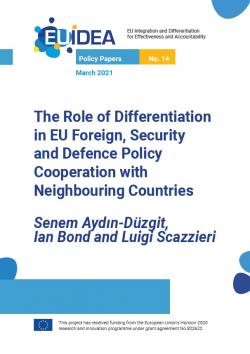The Role of Differentiation in EU Foreign, Security and Defence Policy Cooperation with Neighbouring Countries
The EU extensively practices differentiation in its foreign, security and defence policy, both internally and externally towards its neighbours. Neighbouring countries are plugged into the EU’s Common Foreign and Security Policy and its Common Security and Defence Policy to different degrees, and also cooperate with groups of member states informally outside of the EU framework. The paper focuses on external differentiation in foreign and security policy, undertaking an in-depth assessment of the ways in which Albania, Georgia, Moldova, Montenegro, North Macedonia, Norway, Serbia, Turkey, Ukraine and the UK cooperate with the EU in foreign and security policy. The paper focuses on the effectiveness, sustainability and legitimacy of the EU’s external differentiation with its partners. Finally, it makes recommendations for how the EU and its partners might deepen foreign and security policy cooperation.
-
Details
Rome, IAI, March 2021, 21 p. -
In:
-
Issue
Policy Paper 14
Executive summary
Introduction
1. Turkey
2. Albania, Montenegro, North Macedonia and Serbia
3. Norway
4. The UK
5. Georgia, Moldova and Ukraine
6. Comparative assessment
Conclusions and recommendations
References
List of interviews



